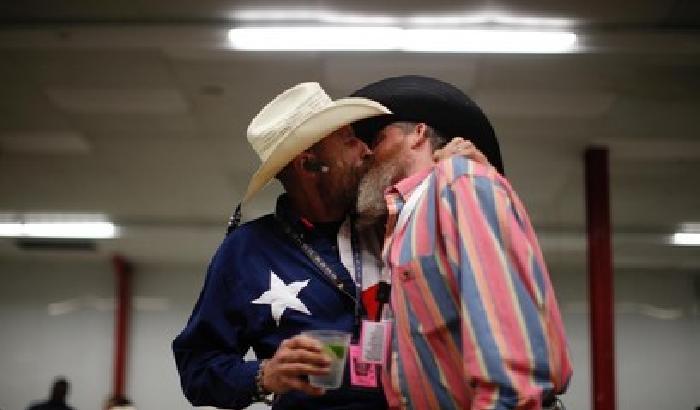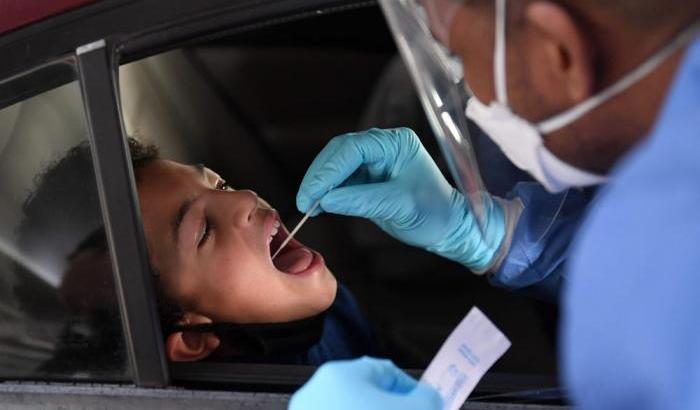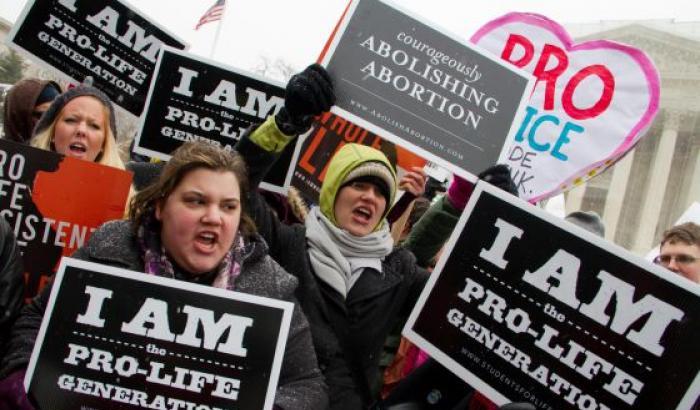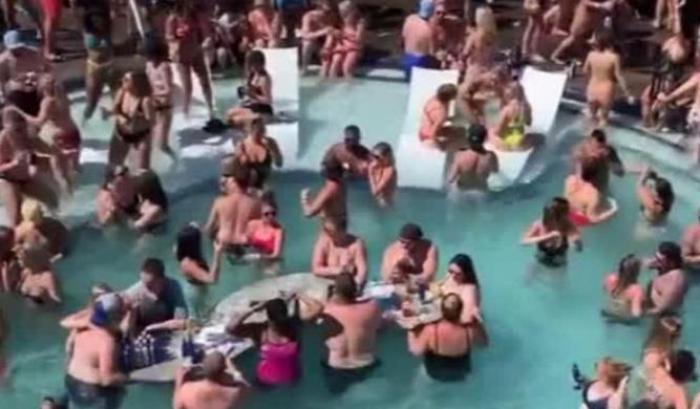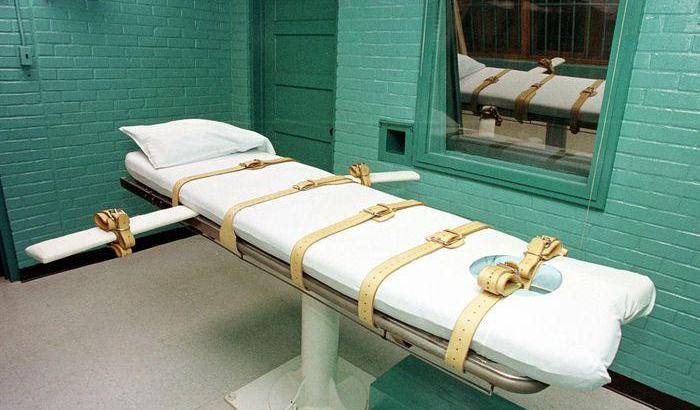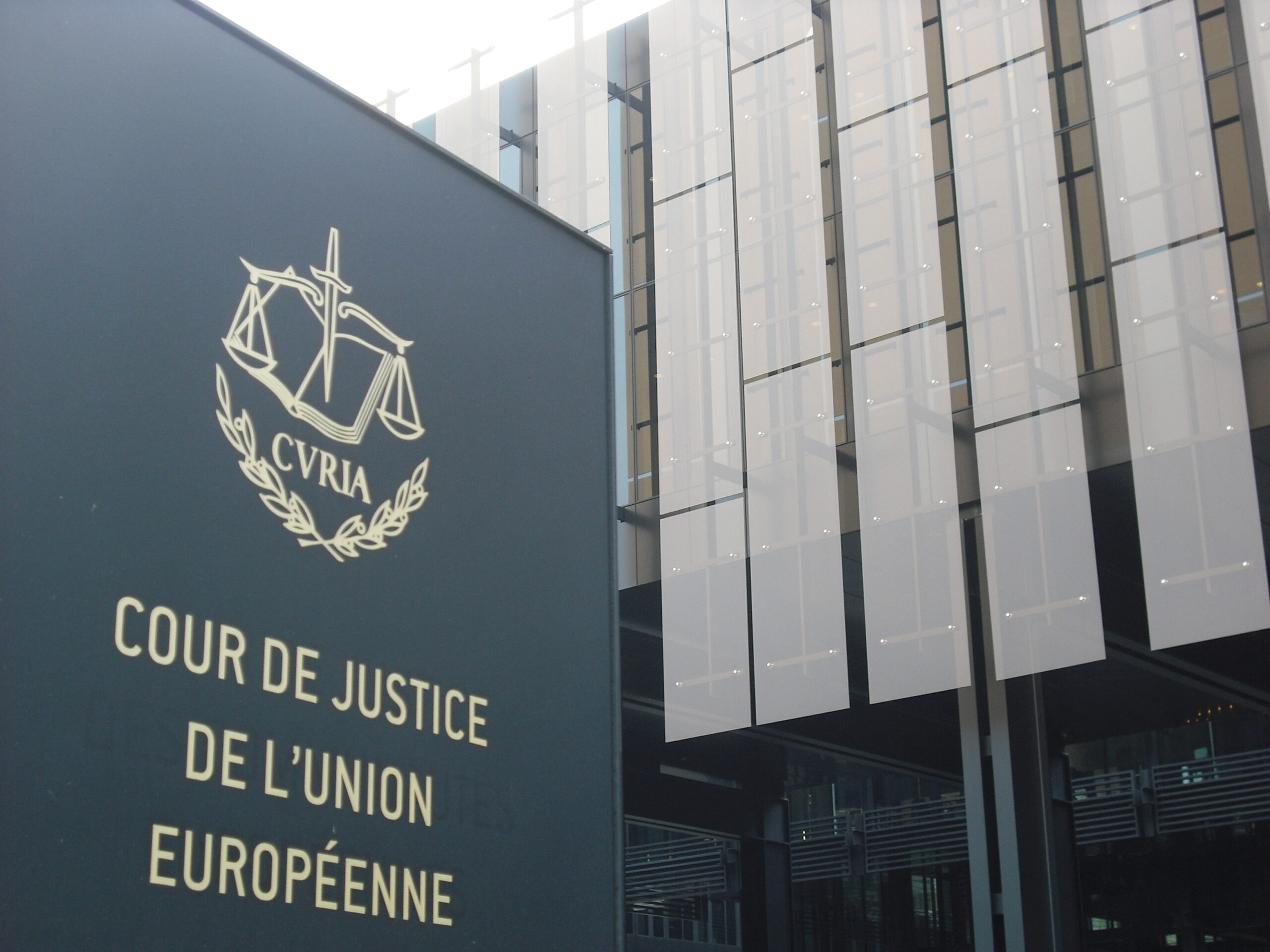Due uomini americani si baciano all’International Gay Rodeo Association nello stato americano dell’Arkansas. Le immagini sono Lucy Nicholson.
L’Arkansas è stato uno degli stati in prima linea nella battaglia tra conservatori culturali e coloro che cercano maggiori diritti per le persone lesbiche, gay , ( LGBT ) bisessuali e transgender .
Le foto della Nicholson raccontano bene questa 35esima edizione, che ancora una volta vuole promuovere i diritti civili, negati da fazioni ultra integraliste.
La Corte Suprema a breve dovrebbe pronunciarsi a giugno se abbattere il divieto di matrimonio gay a livello nazionale.
Come ha detto uno dei partecipanti:
“Tutti meritano la parità di trattamento . Tutti meritano uguali diritti”.
Wade Earp, è un 45enne nativo di Benton, cresciuto in una famiglia cristiana fondamentalista.
Il primo rodeo gay si è tenuta come un evento di raccolta fondi di beneficenza presso la contea di Washoe Fairgrounds a Reno, Nevada su 2 ottobre 1976.
Contestants at the International Gay Rodeo in Arkansas, a Bible Belt state with a same-sex marriage ban on its books, competed in events from barrel racing to bull riding on the soft soil of a fairground that looked like just any small-scale rodeo held throughout the United States.Arkansas has been one of the front-line states in the battle between cultural conservatives and those seeking expanded rights for the lesbian, gay, bisexual and transgender (LGBT) community.
Wade Earp sighed on a clear spring afternoon after a day of horse riding and said, “I wish we didn’t have to have a gay rodeo. I wish we could just rodeo.”
Earp was a contestant at the event in Arkansas, one of the 13 U.S. states where same-sex marriage is not recognised.
The U.S. Supreme Court is expected to rule in June whether to strike down bans on gay marriage nationwide.
“Everybody deserves equal treatment. Everybody deserves equal rights.”
Earp, 45, a native of Benton, Arkansas, was raised in a fundamentalist Christian denomination. He competed in barrel racing, calf roping and steer riding events.
The 35th edition of the Diamond State Rodeo in Little Rock event drew 75 contestants, far outnumbering spectators, from a dozen states and Canada, all hoping to qualify for the International Gay Rodeo 2016 finals in Las Vegas.
For two days gays and lesbians and at least one transgendered man competed.
The arena’s railings were festooned with the banners of corporate sponsors advertising products like beer, whiskey and personal lubricants.
With same-sex marriage now legal in 37 states and Washington D.C., the focus has shifted to states such as Arkansas and the battle between social conservatives and those seeking expanded rights for the LGBT community.
Change might be right around the corner in Little Rock, the state capital, where in May 2014 a state judge declared unconstitutional Arkansas’s ban on same-sex marriage.
But one year later, the Arkansas Supreme Court has yet to decide the state’s appeal, prompting the chief justice and an associate justice to angrily accuse their colleagues of manufacturing a delay.
The Arkansas legislature this year approved a religious freedom bill that critics said would allow for residents to deny service to the LGBT community citing their religious beliefs.
Pressure from Arkansas-based retail giant Walmart Inc and other corporations along with rallies by gay rights activists helped spur the legislature to tone down the proposed law.
“We’re not asking for anything special,” Earp (left) insisted. “We just want what’s right.”
For Earp and his partner, Jonathan Suder, 25, that means marriage, a legal covenant denied them in Arkansas and Texas.
The contentious Arkansas debate over same-sex unions “has drawn our community in Arkansas closer than ever,” organiser Bidwell says.
Bidwell, 68, (right) and Lisa Smith, 59, sidestepped the barrier in Arkansas by traveling from their home in Little Rock to wed in Bidwell’s native New York, where same-sex marriage has been legal since 2011.
Yet to Ashley Vickers, (left) an event volunteer at Little Rock, having to leave the state to marry her partner, Sara Strickland, “is almost insulting.”
“I pay taxes here,” said Vickers, 29, a mental health technician. “I feel bad that I have to even considering going elsewhere to get married.”
